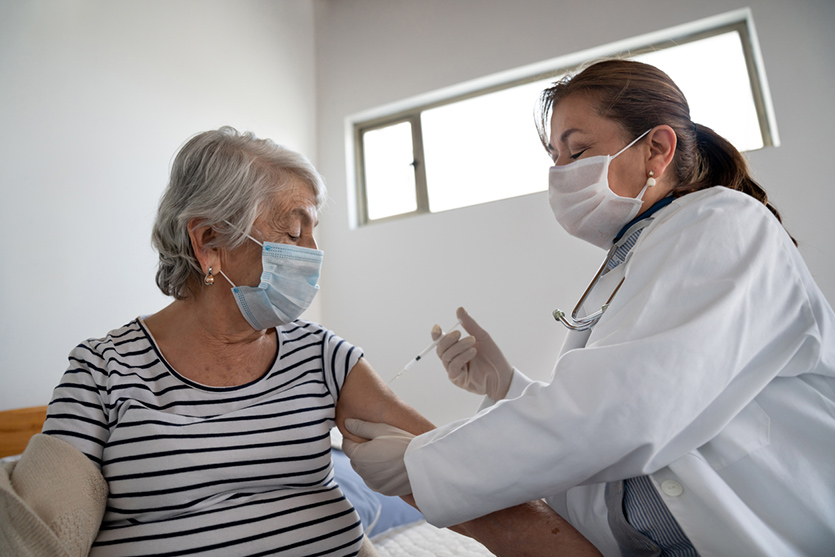Safety and Effectiveness of the COVID-19 Vaccines
For most Americans, vaccines are routine. They have helped us to defeat diseases like smallpox and polio. And they have reduced outbreaks of mumps, measles, and other childhood diseases. In our race to eradicate COVID-19, several new vaccines have emerged rather quickly. However, we want to assure all AbsoluteCare members that these vaccines are safe. We hope some of the questions addressed here will be the answers you are looking for.

Frequently Asked Questions
How safe are the new COVID-19 vaccines?
In large clinical trials, both current vaccines, made by Pfizer and Moderna, received Emergency Use Authorizations (EUA) from the U.S. Food and Drug Administration (FDA). Why? Because their benefits outweigh their risks. The Centers for Disease Control (CDC) continues to monitor and evaluate all reports regarding safety and efficacy.1
What should I expect when I get vaccinated?
Your health is our greatest priority. It’s also the priority of those administering your vaccine. While allergic reactions to either shot are extremely rare, you will be monitored for 15 to 30 minutes after your shot has been administered. If you do experience an adverse reaction, medical staff are on hand to help.
What are the risks associated with getting the COVID-19 vaccine?
The most serious risk is an allergic reaction, addressed above.
What are the side-effects associated with the vaccine?
The most reported side-effects of the vaccine are local pain and swelling at the vaccination site. Other common side-effects are fever, chills, fatigue, and headache. They can happen after either or both shots. In most cases, the side effects go away after a few days.2
Will the vaccine give me COVID-19?
No! There is no live virus in either vaccine. The side effects are your body’s natural immune response and are actually a good sign that the vaccine is doing its job.3
What can I do to alleviate some of my side-effects?
Ask your doctor about whether you can take ibuprofen, acetaminophen, or other over-the-counter pain reliever to reduce pain at the injection site or fever. You may also try topical pain relievers like arnica cream or gel, a cool washcloth, and moving your arm more frequently to avoid muscle stiffness.
I’ve already had COVID-19. Do I need the vaccine?
Yes! While you may develop antibodies that help increase resistance to the disease, no one knows how long this protection lasts. 3
Do I need both doses of the vaccine for it to be effective?
Yes, both doses are necessary. Be sure to schedule these as close to the recommended repeat dose date. For Pfizer shots, this is three weeks. For Moderna, it’s four weeks. Second shots are usually scheduled at the time of your first.3
How effective are the vaccines? Is one better than the other?
The difference between the two shots is minimal. Pfizer has a 95% effective rate, while Moderna’s is 94.1%. This means that about 95% of the people who get the shot will be protected. The remaining 5% may experience greatly reduced symptoms of the disease.3
Why should I get vaccinated?
COVID-19 is a dangerous and potentially deadly illness. Your risk of complications rises with your age and other illnesses, especially diseases that affect breathing. Obesity can also complicate your ability to recover. And while most people do recover, the best chance for good health is not to catch the novel coronavirus in the first place.
While social distancing protocols are important in prevention, we cannot control the actions of others. Your best course is to get vaccinated.
Is there an age limit for the vaccines?
Pfizer’s vaccine is for people aged 16 and older, while Moderna’s is for those aged 18 and older.3 At this time, there is no vaccine data on children under age 16.2
Can I get vaccinated if I’m pregnant or nursing?
Please talk to your doctor about whether you should receive the vaccine.2
Once I’ve had both vaccinations, do I still need to follow safety protocols?
Yes. While the vaccine will protect you from becoming sick with COVID-19, no one knows for sure whether you are still able to carry and spread the disease. Be sure to continue to wear your mask in public spaces, practice social distancing, and practice good hand hygiene.3
Remember: Neither shot protects you 100%. Please continue to keep your distance from anyone who is sick.
